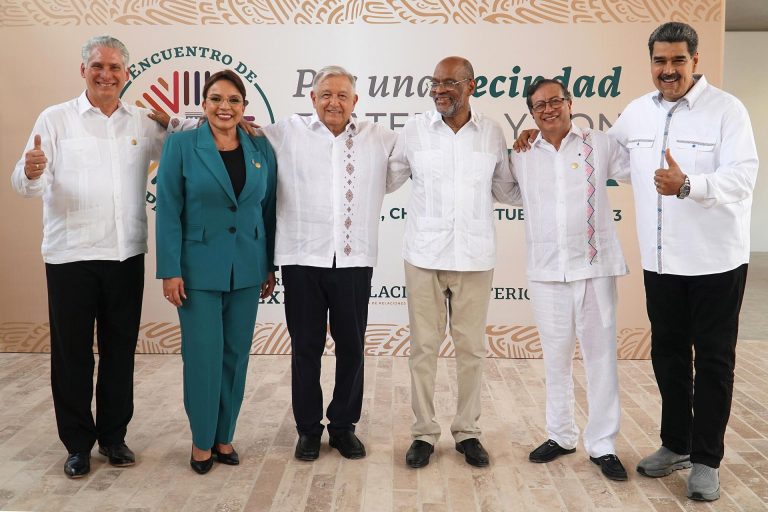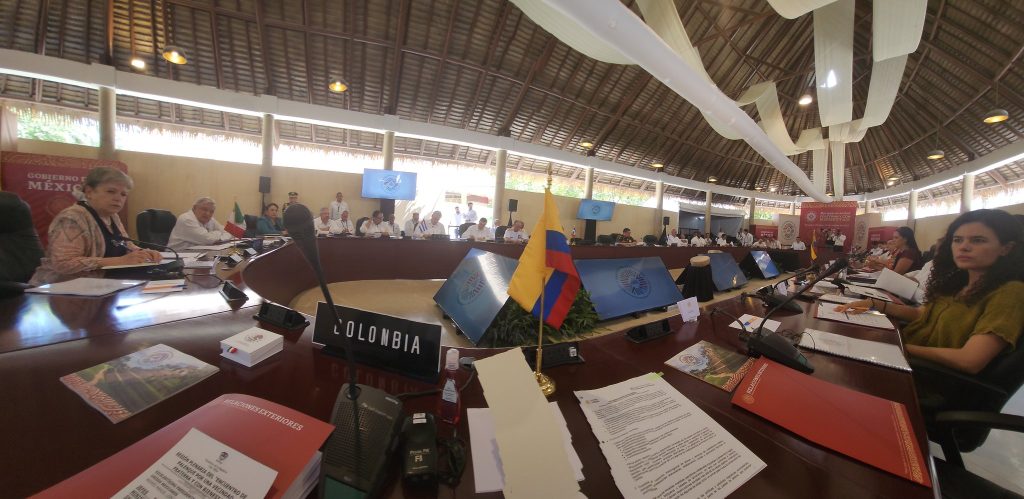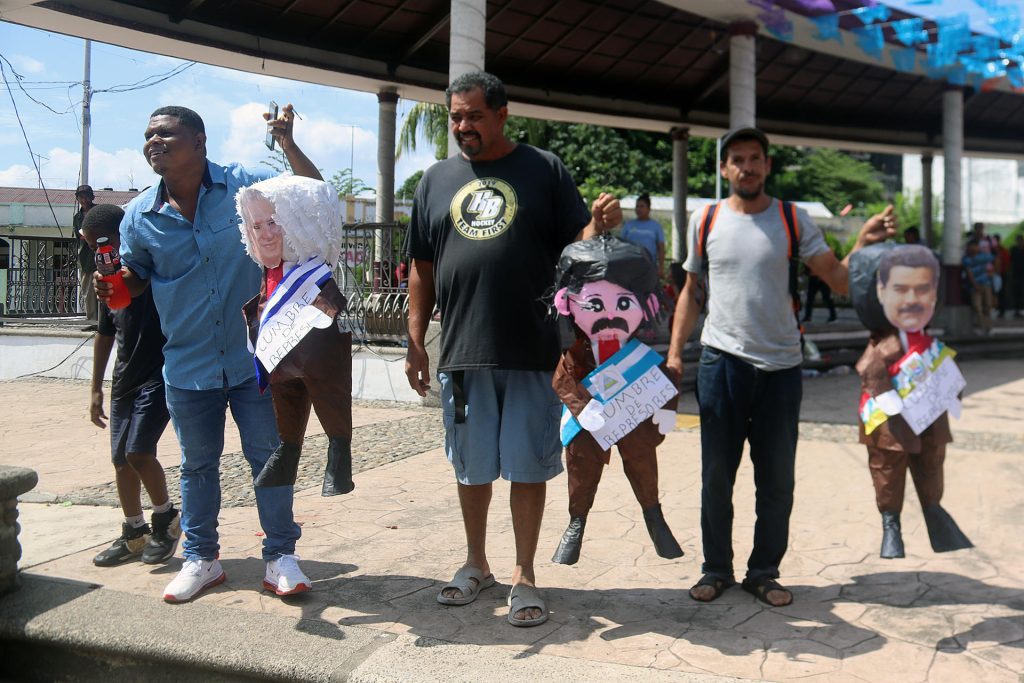24 de octubre 2023

European Concern over Lack of Academic Freedom in Nicaragua

PUBLICIDAD 1M
PUBLICIDAD 4D
PUBLICIDAD 5D
Latin American presidents promise to respect the human right to migrate and to support other legal alternatives for migrants

Presidentes de Latinoamérica durante la cumbre migratoria realizada en México. Foto: EFE | Confidencial
The October 22nd migration summit, involving Mexico and eleven other Latin American countries, concluded on Sunday with a joint declaration. The statement included the promise to respect the human right to migrate and a petition for more legal alternatives for migrants. The Nicaraguan regime of Daniel Ortega didn’t participate.
[We agree] to urge the countries of origin, transit, and destination to implement comprehensive migration policies that respect the human right to migrate, safeguard the rights and dignity of the migrating individuals and their families, and include the promotion of options for permanent legalization,” expressed Mexican Foreign Minister Alicia Barcena, while reading the joint pronouncement.
The declaration comprised 13 points of agreement and was signed by the Heads of State of Colombia, Cuba, Haiti, Honduras and Venezuela; the vice president of El Salvador and deputy prime minister of Belize; as well as ministers and foreign ministers of Costa Rica, Ecuador, Guatemala and Panama. These government leaders had met in Palenque, in the Mexican state of Chiapas, for a summit convoked by Mexican President Andres Manuel Lopez Obrador.
The Latin American government leaders argued: “external factors such as unilateral coercive measures of an indiscriminate nature [a reference to sanctions] negatively affect entire populations, in greater measure the most vulnerable people and communities,” stated the position paper Barcena read.
Considering this, the eleven countries agreed: “to request that the destination countries broaden the regular, orderly and safe routes for migration, with special emphasis on workforce movement, and that they promote the reintegration and return of temporary workers.”
The leaders also alleged that the “selective” measures stimulate irregular migration, referring to United States policies that favor asylum claims from certain applicants from countries such as Cuba, Haiti, Nicaragua and Venezuela, but contemplate the immediate deportation of the rest.
“[We concur] in calling on the destination countries to adopt migration policies and practices in accordance with the current reality of our region, and to abandon those selective and inconsistent ones, in order to avoid the arbitrary effects of what they call dissuasive measures, such as the legalization of certain nationalities,” Barcena indicated.
The Nicaraguan regime was the most notable absentee from the Palenque meeting, despite the very significant increase in migration the country has seen in the past several years, especially migration towards the United States. Nonetheless, this week the dictatorship cynically blamed the sanctions imposed by the US, Canada, and the European Union for the massive migration. This was also the position of the governments attending the October 22nd migration summit in Mexico.

According to the Ortega regime, the imposition of sanctions comprise “unilateral coercive measures against honorable and sovereign peoples.” In reality, however, in the case of Nicaragua the sanctions are directed against high public officials for violating the human rights of Nicaraguans and undermining democracy. These government figures, among other things, are the true causes of the massive irregular migration.
According to statistics from the US Office of Customs and Border Patrol (CBP): in 2021, 87,567 Nicaraguans were detected or detained at the border crossings between Mexico and the US. In 2022, the number jumped to 217,092 – or 2.4 times more than the previous year.
In the face of this sudden and strong increase, the US government announced at the beginning of 2023 that it would no longer receive Nicaraguans seeking asylum at the border. Instead, the Biden administration established a program known as “humanitarian parole,” to allow Nicaraguans to apply for a special visa that would allow them to live and work in the US for two years. However, in order to apply, interested parties must have a passport, pay for an airline ticket and have a registered ‘sponsor” in the United States to initiate the application process.
In the seven months since the program began – from January to July 2023 – 30,700 Nicaraguans were able to emigrate under the measure.
The Mexican summit took place at a moment when Mexico and Central America are confronting an “unprecedented” flow of migrants, according to the International Organization for Migration. According to Lopez Obrador, nearly 16,000 migrants are arriving at the Mexican borders daily.
The Mexican government called the meeting with the aim of presenting a common regional position to US President Joe Biden in November.
As a first point, the countries agreed to “elaborate a plan of action” focused around food security, environmental protection, energy security, trade, investment and combatting organized crime.
The Mexican government offered to cooperate with its social programs: Sembrando Vida [“Planting life”] for farmers and Jovenes Construyendo el Futuro {“Youth Building the Future”] for young workers, as well as other programs in gas and renewable energy.
The governments also promised to encourage trade, and work to lift sanctions and “coercive measures” in the region, a reference chiefly to Cuba and Venezuela.
They also promised to support for Haiti in “reestablishing a secure environment” and the “normalization” of the country in the wake of its political crisis, and to promote efforts to reassess the international financial architecture of Latin America’s sovereign debt.
Migrants burn effigies of the dictators
A few miles away from the Summit, nearly 200 migrants stuck at Mexico’s southern border burned effigies of Nicaragua’s Daniel Ortega, Cuba’s Miguel Diaz-Canel, and Venezuela’s Nicolas Maduro as part of a protest against the migration summit.
The foreigners gathered at “Bicentennial Park” in the southern Mexican city of Tapachula, paraded the three piñata-like figures around, and then staged a simulated public trial, accusing the governments of not supporting the migrants.
Irineo Mujica, director of Pueblos sin Fronteras (“People without Borders”] stated that this “counter summit” was a protest to denounce the fact that Mexican President Andres Manuel Lopez Obrador had no real solution.
“What the summit will bring is more of the same. It’s all nothing more than the corruption of countries that want to make money from the migration, the pain and the bloodshed,” the recognized migrant defender accused.

During the march, Venezuela migrant Leonerge Acero said he didn’t agree with Lopez Obrador’s meeting with Nicolas Maduro, since he felt that the very conditions created by the Venezuelan leader were the factors forcing him to leave the country.
Speaking to an imaginary Maduro, the migrant exhorted: “There’s nothing for you to come and do here, because you don’t know what it is to migrate. It’s your fault that we’re here in this suffering, your fault that we’re migrating. Truth is, I don’t understand why you’re meeting with that president,” Acero emphasized.
Ysquel Jean of Haiti participated in this demonstration to stress that he left his country because, in his view, the majority of the politicians are corrupt.
Like the other migrants, he demanded that the migrant summit aimed at producing a joint regional proposal for Lopez Obrador to present to the United States, result in humane policies not punitive ones.
“We ask the Mexican government to treat us well, to give us papers,” Jean urged.
“Many Venezuelans and Haitians are suffering great need, sleeping in the streets and parks. [Mexico] should help and offer refuge,” he concluded.
This article was originally published in Spanish in Confidencial and translated by Havana Times.
PUBLICIDAD 3M
Confidencial es un diario digital nicaragüense, de formato multimedia, fundado por Carlos F. Chamorro en junio de 1996. Inició como un semanario impreso y hoy es un medio de referencia regional con información, análisis, entrevistas, perfiles, reportajes e investigaciones sobre Nicaragua, informando desde el exilio por la persecución política de la dictadura de Daniel Ortega y Rosario Murillo.
PUBLICIDAD 3D